Introduction
Have you ever experienced a tingling sensation or movement in your mouth, only to discover that it was caused by mouth larva? This phenomenon, although rare, can be quite shocking and unsettling. But fear not, as we delve into this topic to uncover the mystery of mouth larva, including its causes and treatments.
What is Mouth Larva?
Mouth larva, also known as oral myiasis, is a condition where fly larvae infest and grow in the oral cavity. These larvae can be from various fly species, such as the Dermatobia hominis (human botfly), Cochliomyia hominivorax (primary screwworm), or Oestrus ovis (sheep botfly). The presence of these larvae in the mouth can cause discomfort, pain, and even lead to serious complications if not addressed promptly.
Causes of Mouth Larva
-
Poor Oral Hygiene: Poor oral hygiene can create a hospitable environment for flies to lay eggs in the mouth, leading to the development of mouth larvae.
-
Open Wounds or Sores: Open wounds or sores in the mouth can attract flies, which may lay their eggs in these areas, eventually leading to oral myiasis.
-
Eating Contaminated Food: Consuming contaminated food or drinks that have been exposed to flies can introduce fly eggs into the mouth, potentially causing mouth larva infestation.
Symptoms of Mouth Larva
- Tingling or Crawling Sensation: Individuals may experience a tingling or crawling sensation in the mouth, indicating the presence of larvae.
- Pain and Discomfort: Pain, discomfort, and swelling in the affected area can be present.
- Visible Larvae: In some cases, individuals may actually see visible larvae moving in the mouth, which can be extremely distressing.
Diagnosis and Treatment
Diagnosis of mouth larva is typically done through a thorough examination by a dentist or healthcare provider. Once diagnosed, the treatment involves the removal of the larvae from the mouth. This can be done through various methods, including:
- Manual Removal: The dentist may manually remove the larvae using forceps or tweezers.
- Oral Irrigation: Oral irrigation with saline solution or antiseptic mouthwash can help dislodge and remove the larvae.
- Medication: In some cases, medication may be prescribed to kill the larvae before removal.
Prevention of Mouth Larva
To prevent mouth larva infestations, consider the following precautionary measures:
- Maintain Good Oral Hygiene: Brush and floss regularly to prevent oral infections that may attract flies.
- Cover Open Wounds: Keep any open wounds or sores in the mouth covered to avoid attracting flies.
- Avoid Contaminated Food: Be cautious of contaminated food or drinks and ensure proper hygiene practices while consuming them.
FAQs (Frequently Asked Questions)
- Can mouth larvae pose any serious health risks?
Mouth larvae can lead to infections and inflammation if not treated promptly, potentially causing serious health risks.
- Are children more prone to mouth larva infestations?
Children may be more vulnerable to mouth larva infestations due to their habits of playing outdoors and potential lack of oral hygiene practices.
- Can mouth larva infestations be prevented entirely?
While it may not be possible to prevent mouth larva infestations entirely, practicing good oral hygiene and taking precautionary measures can significantly reduce the risk.
- How quickly should one seek medical attention for mouth larva symptoms?
It is crucial to seek medical attention as soon as symptoms of mouth larva are noticed to prevent complications and ensure prompt treatment.
- Can mouth larva infestations recur after treatment?
There is a possibility of recurring mouth larva infestations, especially if proper preventive measures are not taken post-treatment. Regular dental check-ups may help in detecting any potential reinfestation.
In conclusion, while mouth larva infestations are uncommon, it is essential to be aware of the causes, symptoms, and treatment options available. By maintaining good oral hygiene practices and taking necessary precautions, the risk of mouth larva infestations can be minimized. If you suspect you have mouth larvae, do not hesitate to seek medical attention promptly for proper diagnosis and treatment.

